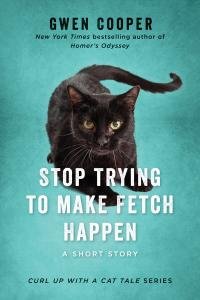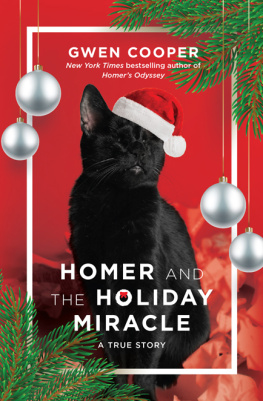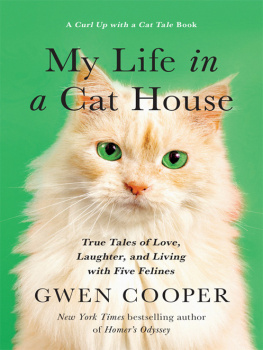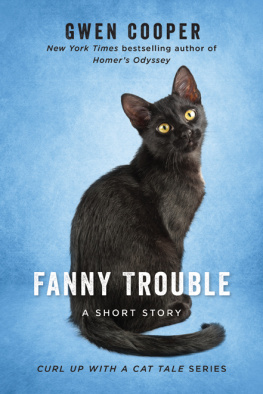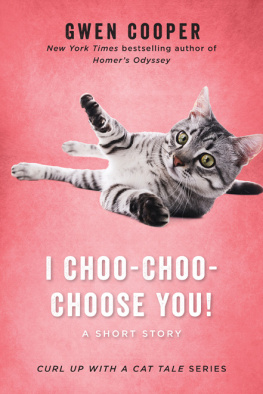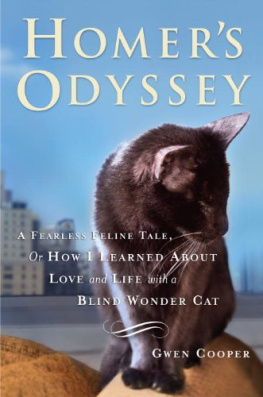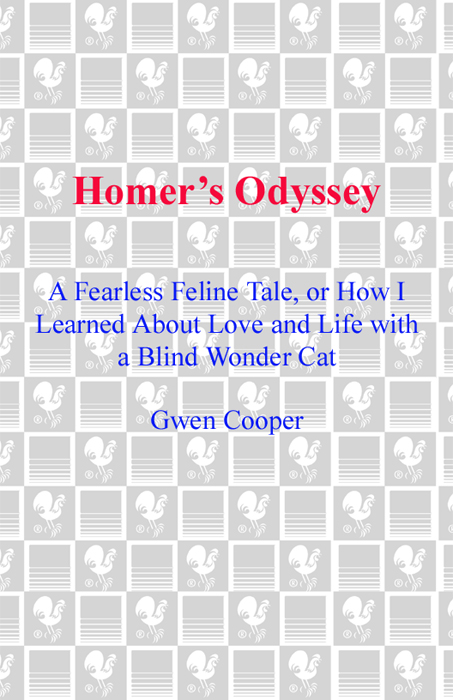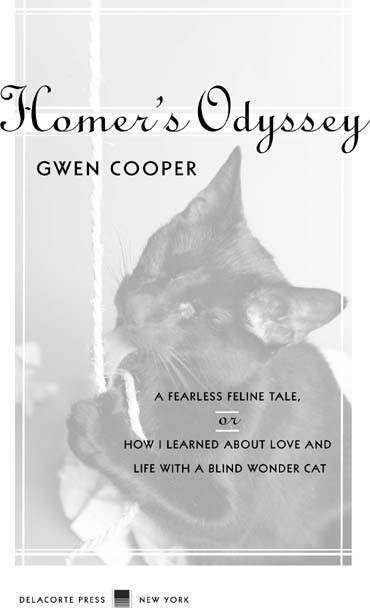FOREWORD
BY PATRICIA KHULY, VMD
WHEN I FIRST SAW THE KITTEN, HE WAS A MINUSCULE BIT OF BLACK FUZZ cupped in a young womans outstretched hands. No different from any other kitten, it would seemthat is, until he raised his head and emitted an impressive yowl for a creature only four inches in length, tip-to-tail.
Tiny though he was, he turned to the sound of my voice. Thats when I saw his eyes. This two-week-old foundling was clearly suffering from a severe infection that would surely take his sight, if not his life.
The well-meaning couple whod found him practically begged me to euthanize him immediately. Despite their entreaties, I performed a careful physical examination as the kitten struggled, legs flailing, and mewled vigorously on the stainless-steel exam table. Finally, I announced that the kitten seemed perfectly healthyif you discounted his ocular condition. Would they consider adopting him if I was able to treat his infection?
For a long list of reasons, the couple could not provide a home for such a young kitten. They worked. They had a dog. They didnt have the money. And what were the chances that he would ever be able to see again, anyway?
Oh none. No chance. I explained that I intended to surgically remove his eyes to save his life.
Im pretty sure thats when I lost them. Shaking their heads in disbelief, they elected to sign him over to my care. His pitiable cries probably pushed their decision along the path of rejectionthey were convinced he was suffering terrible pain.
After his owners agreed to give him up, he was mine to treat as seemed in his best interests. I still had my doubts, but they were laid to rest once the source of his immediate discomfort was revealed: hunger. A small bowl of cat food mashed with milk replacer stifled his cries. He was peacefully asleep within minutes, sealing my decision to treat his eyes, never mind the blindness to come.
After all, I thought, this kitten had never had the benefit of sight. Unlike human babies, cats are born with their eyes sealed to the world for ten to thirteen days. This two-weekers relatively long-standing infection had almost certainly prevented any emerging vision. Once treated, hed be blind without ever missing the sensory capacity for sight. Like many animals, kittens are capable of rerouting their neurologic faculties for successful survival through a process called individual environmental adaptationmy fancy term for I refuse to put him to sleep. How could I renege on my duty to alleviate suffering if I could maintain a life worth living?
Ask any young, idealistic vets, and theyll likely confess to the same kind of sin I committed the day this blind kitten came my way. If the animal is afflicted yet healableand even remotely adoptableIts meant to be, we reason. Theyre the ones who always strum our heartstrings with their astonishing survival skills and irresistible ugly-duckling potential.
I knew there was no way I could keep a blind kitten in my toddler-, allergy-, and big-dog-inhabited household. Yet I certainly couldnt let a vigorous kitten die over a pesky little issue like homelessness. Someone in my circle of friends and family will doubtless find him as appealing as I do, I rationalized. Hed find a home if I could just find someone with the requisite mix of eccentricity and empathy to take on a special-needs case.
What followed were a couple of weeks of rejection after rejection. I enlisted my family, an animal-loving clan who dutifully spread the word of the blind kitten in need of a safe home. I placed ads and sought out vet school friends with a penchant for the pitiful. None of it yielded any potential takers.
By this time Id dispensed with all my rationalizing and self-flagellation. The kitten had bounded back to life after surgeryso much so that my staff and I were irretrievably in love with him. There were days I really couldnt bear the thought of parting with him.
How could I help but be smitten with his scraggly little blackness, his tiny sunken sockets, his insatiable appetite for feedings, pettings, cuddlings, and play sessions? Yes, he even romped like a normal kitten, despite his eyelessness. In short, he was eminently lovable at least by all standards except the one with which most humans preoccupied themselves: his appearance.
Finally, one young woman with two cats of her own who were treated at my practice promised to have a look. But when I finally handed my dark furball over to this prospective owner, I felt a twinge of trepidation. Would she look at him with disgust the way others had? Demur due to an inability to take on such a strange and disabled thing?
Instead, she whispered gently to him. She picked him up and held him. He purred in her arms. To my surprise and utter relief, she earned my eternal gratitude when she said, Im taking him home.
Homer was the first hopeless case Id taken on in my then-short career. Though Ive had many more since, his was the seminal experience, one that ultimately paved the way for so many others.
Homers odyssey will doubtless mean different things to different people. But for me, Homer will always be an intensely personal reminder of what veterinary medicine can pull off when its infused with the idealism of youth. Hell always remind me that theres nothing a partnership between a veterinarian, a loving owner, and one fighting patient cant achieve.
Homers story is one for all of us to live by.
P ATRICIA K HULY , VMD, MBA
Dolittler.com
Miami, Florida
CONTENTS
PROLOGUE The Cat Who Lived
Tell me, O Muse, of that ingenious hero who traveled far and wide
HOMER , The Odyssey
THE ROUTINE WHEN I GET HOME AT THE END OF THE DAY IS ALWAYS THE same.
The ding! of the elevator is the first cue to sensitive ears that my appearance is imminent, and by the time my key hits the lock I hear the soft press of paws on the other side of the door. Ive found that I tend to open all doorseven those in other peoples homeswith enough caution to prevent any furry miscreants from tumbling outside. Rather than seeking the floor, however, its only a matter of seconds before those paws have found their way from the door to the front of my legs, and a tiny black cat makes his best effort to shimmy his way up my body as if I were a tree trunk.
To prevent injury to either my clothes or the skin beneathhis claws are small, but highly effectiveI squat down with a cheerful Hi, Homer-Bear! (A nickname given when he was a kitten on account of his glossy black fur, like a grizzly bears coat.) Homer takes this as his cue to jump onto my knees, placing his front paws on my shoulders and rubbing his nose against mine with much loud purring and a series of short, clipped mews that sound uncannily like the yips of a puppy. Hey, little guy, I say, scratching him behind his ears. This sends Homer into veritable convulsions of delight, andno longer content with mere nose-to-nose contacthe presses his entire face to my forehead, sliding it down to my cheek and back up again.
Squatting in the high heels I typically wear (Im only five foot one, but I refuse to live life as a short person) is even more painful than it sounds, so I pick Homer up and deposit him back on the ground, rising to my feet and finally entering the apartment I share with my husband, Laurence. Keys, coat, and bags are quickly stowed away. When you live with three cats, you learn that the best way to prevent fur accumulation on the clothes you wear publicly is to change into knock-around-the-house garb immediately upon arrival. So from there I head to the bedroom and make a quick change.









